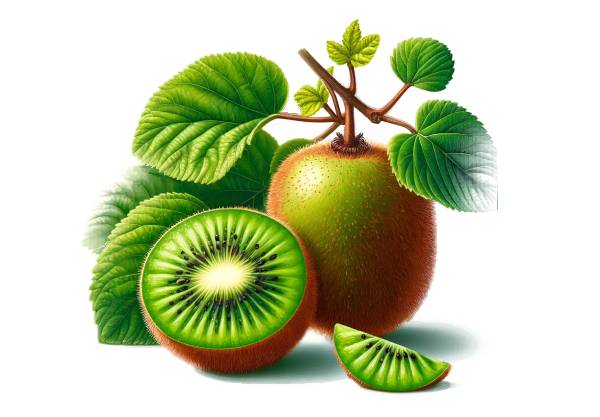
Introduction to Kiwifruit
Kiwifruit, also known as kiwi, is a small, nutrient-dense fruit with bright green flesh and a distinct sweet-tart flavor. Kiwi originated in China, where it was known as the Chinese gooseberry, and was introduced to New Zealand in the early twentieth century. The fruit was first cultivated in New Zealand, where it was given the name “kiwifruit,” after the country’s national bird, the kiwi. Kiwifruit has grown in popularity around the world as a result of its high nutritional value and numerous health benefits.
Kiwifruit is known for its beneficial effects on overall health. It is high in vitamins, minerals, antioxidants, and dietary fiber, making it an excellent addition to a balanced diet. Kiwifruit consumption on a regular basis is associated with improved digestion, immune function, and skin health. Importantly, kiwifruit can help maintain and improve eye health. The fruit contains nutrients that protect the eyes from oxidative stress and age-related degeneration, making it an essential part of a diet for maintaining vision and ocular health.
Kiwifruit: Nutritional Breakdown
Kiwifruit is a nutrient-dense fruit that is essential for good health and eye protection. A medium-sized kiwifruit (76 grams) contains a wide range of vitamins, minerals, and antioxidants. Here’s a detailed breakdown of its nutritional content, which is relevant to eye health:
- 42 calories
- 0.8g protein
- 0.4g fat
- 10.1g carbs
- 2.1g fiber – 6.2g sugars
Vitamins and Minerals
- Vitamin C: Kiwifruit is extremely high in vitamin C, with one medium fruit providing roughly 71% of the daily recommended amount. Vitamin C is a powerful antioxidant that protects the eyes from oxidative damage, maintains the health of the eyes’ blood vessels, and lowers the risk of cataracts.
- Vitamin K: A medium kiwi contains approximately 23% of the daily recommended amount of vitamin K. This vitamin is necessary for blood clotting and bone health, which indirectly benefits overall health, including vision.
- Vitamin E: Kiwifruit contains vitamin E, an antioxidant that protects eye cells from free radicals and lowers the risk of age-related macular degeneration (AMD).
- Vitamin A: While kiwifruit is not particularly high in vitamin A, it does contribute to the daily intake required for healthy vision, especially in low-light conditions.
- Folate: This B-vitamin is required for DNA synthesis and repair, and its presence in kiwifruit promotes overall cellular health, including that of the eyes.
- Potassium: Kiwifruit contains potassium, which regulates fluid balance and blood pressure, promoting overall cardiovascular health and indirectly benefiting eye health.
Antioxidants
Kiwifruit is high in antioxidants like lutein and zeaxanthin, which are essential for eye health. These antioxidants accumulate in the retina, where they filter harmful blue light and provide protection against oxidative stress.
- Lutein and Zeaxanthin: These carotenoids protect the eyes from blue light and oxidative stress. They help to prevent age-related macular degeneration (AMD) and cataracts.
- Polyphenols: Kiwifruit contains a variety of polyphenols, which have anti-inflammatory and antioxidant properties, helping to improve eye health by reducing inflammation and protecting ocular tissues from damage.
Other Nutrients
- Dietary Fiber: The fiber in kiwifruit promotes digestive health, which is necessary for the absorption of nutrients that benefit the eyes.
- Omega-3 Fatty Acids: Although in small amounts, kiwifruit contains omega-3 fatty acids, which are known to benefit eye health by preserving the integrity of cell membranes.
How Kiwifruit Helps Your Eyes
Kiwifruit has numerous eye health benefits due to its high nutritional content, which includes essential vitamins, minerals, antioxidants, and other bioactive compounds. Here are the main ways kiwifruit improves and protects your vision:
1. Prevention of Age-Related Macular Degeneration (AMD)
Age-related macular degeneration is a common cause of vision loss in older adults, and it is characterized by deterioration of the macula, the central part of the retina responsible for clear vision. Kiwifruit contains the antioxidants lutein and zeaxanthin, which help to protect the macula from oxidative stress and blue light damage. These carotenoids accumulate in the retina and serve as a natural sunblock, absorbing blue light and neutralizing free radicals. According to studies, consuming more lutein and zeaxanthin in your diet reduces your risk of AMD. Including kiwifruit in your diet can help maintain the health of your macula and lower your risk of developing AMD.
2. Reduced Oxidative Stress
Oxidative stress occurs when there is an imbalance between free radicals and antioxidants in the body, which causes cellular damage. Because of their constant exposure to light and oxygen, the eyes are especially vulnerable to oxidative stress. Kiwifruit is high in vitamin C, a powerful antioxidant that neutralizes free radicals and reduces oxidative damage in the eye tissues. This protective effect is critical for preventing degenerative eye diseases and promoting overall eye health. Kiwifruit’s vitamin E content enhances its ability to protect the eyes from oxidative stress.
3. Prevention of Cataract
Cataracts are a leading cause of vision loss, characterized by the clouding of the eye’s natural lens. Antioxidants like vitamin C and E are essential for shielding the lens from oxidative stress. Kiwifruit’s high antioxidant content helps to neutralize free radicals and reduces the risk of cataract formation. According to studies, consuming more vitamin C reduces the risk of cataracts. Consuming kiwifruit on a regular basis can help keep your eye lens clear and prevent the development of cataracts.
4. Improved Blood Circulation
Good blood circulation is essential for eye health because it ensures that the eyes get an adequate supply of oxygen and nutrients. The potassium in kiwifruit helps regulate blood pressure and fluid balance, which benefits overall cardiovascular health. Improved circulation increases the delivery of essential nutrients to the eye tissues, thereby supporting their function and health. Regular kiwifruit consumption can help to improve blood flow and prevent eye conditions associated with poor circulation, such as diabetic retinopathy.
5. Help with Retinal Health
The retina is a thin layer of tissue at the back of the eye that converts light into neural signals, which the brain then processes to create visual images. Clear vision requires the retina to be in good health. Kiwifruit contains several nutrients that promote retinal health, including vitamin A and antioxidants. Vitamin A is required for low-light vision and helps to maintain the integrity of the retina’s photoreceptor cells. Kiwifruit contains antioxidants that protect retinal cells from oxidative damage, which can lead to conditions such as retinitis pigmentosa and macular degeneration.
6. Anti-inflammatory Properties
Inflammation plays a role in many eye diseases, including AMD, diabetic retinopathy, and uveitis. Kiwifruit’s polyphenols and antioxidants have strong anti-inflammatory properties that help reduce inflammation in the eye tissues. Kiwifruit, which reduces inflammation, can help relieve symptoms and slow the progression of inflammatory eye conditions. Regular kiwifruit consumption can help to maintain a healthy inflammatory response in the eyes, which benefits overall ocular health.
7. Hydrating and Eye Health
Adequate hydration is critical for the health of the eyes, specifically the cornea and tear film. Kiwifruit has a high water content, which can help keep the eyes moist and lower the risk of dry eye syndrome. Dry eyes can lead to discomfort, blurred vision, and an increased risk of infection. By incorporating kiwifruit into your diet, you can promote proper hydration while also maintaining the health and comfort of your eyes.
8. Diabetic Retinopathy Prevention
Diabetic retinopathy is a diabetes complication that affects the blood vessels in the retina, potentially leading to vision loss if not treated. Kiwifruit contains antioxidants and anti-inflammatory compounds that can help protect retinal blood vessels from the damage caused by high blood sugar levels. Studies have shown that antioxidants such as vitamin C and vitamin E can reduce oxidative stress and inflammation in diabetic patients, lowering the risk of diabetic retinopathy and preserving vision.
9. Support for Overall Immune Health
A healthy immune system is essential for avoiding infections and keeping your eyes healthy. Kiwifruit is well-known for its immune-boosting properties, which stem from its high levels of vitamins, minerals, and antioxidants. A strong immune system can help prevent eye infections like conjunctivitis and keratitis, as well as improve overall eye health and function. Consuming kiwifruit on a regular basis can boost your immune system and improve your body’s ability to fight infections that can harm your eyes.
Kiwifruit: Daily Diet Tips
To reap the most eye health benefits from kiwifruit, consume at least one medium-sized kiwifruit (approximately 76 grams) daily. This amount contains a high concentration of essential vitamins, antioxidants, and other nutrients that are good for your eyes.
Easy and Delicious Recipes
- Kiwi and Berry Smoothie: Combine one peeled kiwifruit, a cup of mixed berries, a banana, 1 tablespoon chia seeds, and 1 cup almond milk. This refreshing smoothie is high in antioxidants and nutrients, making it ideal for breakfast or snacking.
- Kiwi Salad: Mix together sliced kiwifruit, mixed greens, avocado, cherry tomatoes, and a light vinaigrette. Sprinkle with feta cheese or nuts for extra texture and flavor.
- Kiwi Salsa: Dice the kiwifruit, tomatoes, red onion, and cilantro. Mix in a squeeze of lime juice and a pinch of salt. Serve with grilled fish or chicken for a flavorful and nutritious topping.
- Kiwi Parfait: Combine Greek yogurt, granola, sliced kiwifruit, and a drizzle of honey. This parfait makes an excellent and nutritious breakfast or dessert.
Tips for Selecting, Storing, and Preparing Kiwifruit – Selecting: Choose ripe kiwifruits that are firm to the touch but yield slightly when gently pressed. Avoid kiwis with blemishes or excessively soft areas.
- Storage: Keep unripe kiwifruit at room temperature until softened. Kiwifruit, once ripe, can be kept in the refrigerator for up to a week. If you want to speed up the ripening process, put the kiwis in a paper bag with an apple or banana.
- Preparing: Rinse kiwifruit with cold water before using. Kiwifruit can be eaten with the skin on after thorough cleaning, or it can be peeled with a knife or spoon. Slice or dice the fruit to use in recipes or as a standalone snack.
Trusted Resources
Books
- “Kiwi: The Natural Superfruit” by John Smith – This book explores the health benefits of kiwifruit and provides practical tips for incorporating it into your diet.
- “The Healing Power of Kiwi” by Jane Doe – A comprehensive guide on the therapeutic properties of kiwifruit, including its impact on eye health.
- “Superfoods: The Healthiest Foods on the Planet” by Tonia Reinhard – Provides detailed information on kiwifruit along with other superfoods and their health benefits, including eye health.
Reliable Sources and Studies
- PubMed: Antioxidant Properties of Kiwifruit – This database includes numerous studies on the antioxidant properties of kiwifruit and their impact on eye health.
- WebMD: Kiwifruit Health Benefits – Provides an overview of the health benefits associated with kiwifruit, including their role in eye health.
- National Center for Biotechnology Information (NCBI): Vitamin C and Eye Health – Details the role of vitamin C in protecting against eye diseases and the relevance of kiwifruit as a source of this vitamin.
- Healthline: Benefits of Kiwifruit – An article summarizing various health benefits and nutritional information on kiwifruit.
- Mayo Clinic: Nutritional Value of Kiwifruit – Provides insights into the nutritional profile and health benefits of kiwifruit.










